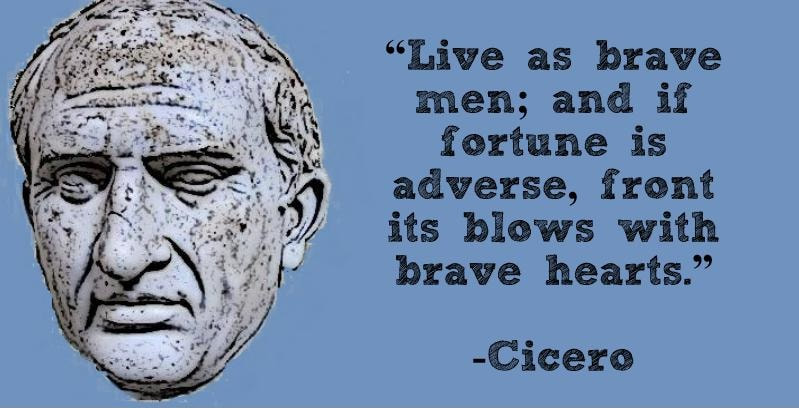The Roman statesman Cicero is no exception. Cicero is remembered more for having been a great orator, interpreter of Greek philosophy, and a philosopher in his own right, rather than an as iron-willed sage or near sage like the Stoic Cato the younger. Yet Cicero seems to have been tough enough in the face of hardship. He was exiled, betrayed by his longtime wife, endured the sudden untimely death of his favorite daughter, and was eventually assassinated on account of his support for the Republic and opposition to Caesar and Mark Anthony.
Cicero was named an enemy of the state, yet he enjoyed popular support and was hidden from his persecutors for a time. When they finally caught up with him, he is reported to have said, “There is nothing proper about what you are doing, soldier, but do try to kill me properly.” He bowed to his captors, leaning his head out in a gladiatorial gesture indicating that he wouldn't resist.[1]
That sounds pretty tough to me. Cicero tried to subordinate the intellectual or theoretical exercise of philosophy to a life of virtuous practice.[2] He was an unceasing supporter of the Republic and fearless when faced with his own death. It is on this basis – considering the example Cicero set by his actions – that we might learn something about being mentally strong from his eclectic philosophy. Here are 5 great pieces of advice on fortitude from Cicero's mouth:
1. Be Confident
“Confidence is that feeling by which the mind embarks in great and honorable courses with a sure hope and trust in itself.”
In other words, confidence is basically a habit or a hexis. You can build up that habit by pretending that you already have all the confidence that you would like to have. I've done this in my life when I was a teenager and it worked wonders for me. It's basically a fake it until you make strategy grounded in philosophy. If you aren't as confident as you would like, pretend to be very confident for 30 days. Epictetus thinks that one month is the length of time required for new behaviors to become second nature for us.
2. Don't Worry About What Other People Think of You If You Are Doing The Right Thing
“I have always been of the opinion that unpopularity earned by doing what is right is not unpopularity at all, but glory.”
We can apply this maxim in our lives too, even when the stakes aren't quite so high. Don't look to do only what is the easiest for you, focus on doing what is right, even if it takes longer and creates more hassle for you personally. Don't worry about other people's opinion if you know you are making the right choice. You can't control what others think.
3. Be Brave
“Live as brave men; and if fortune is adverse, front its blows with brave hearts.”
Cicero is reported to have had some personal difficulty with changes of fortune since he was prone to overreaction to political and private change.[5] He fell into a depression when he was exiled, after the death of his daughter, and when he was no longer involved in public life. But he never gave up hope that Roman Republic would be restored. Cicero certainly faced many changes in fortune in his life, and despite his temperment, he seems to have dealt as bravely as he could with them, especially the moment of his death.
I also have never dealt very well with change. However the nature of life itself is change. We should aspire to to Cicero's ideal of courage in the face of misfortune even if it challenges us personally.
4. Don't Give Up Hope
“While there's life, there's hope.”
Cicero seems to have tried his best to turn a difficult season of his life into a productive one, and thanks to him, many great works of philosophy that we enjoy today survived antiquity.
5. Learn From Your Mistakes
“It is the nature of every person to err, but only the fool perseveres in error.”
You fell in love with the wrong person? It happens. You failed to achieve an important goal? Everyone who succeeds fails first. You made the wrong choice regarding an important decision? At least you came away from the experience more knowledgeable than when you started.
Don’t be afraid of making mistakes. Be afraid of repeating the same mistakes over and over again during the course of your life. When you make a mistake or something goes wrong in your life, ask yourself, what can I learn from this? What does this situation have to teach me? This is the essence of philosophy.
~
Sources:
- Cicero. (2017, July 28). Retrieved July 30, 2017, from https://en.wikipedia.org/wiki/Cicero
- Cicero’s Skepticism and His Recovery of Political Philosophy. (n.d.). Retrieved July 30, 2017, from https://books.google.com/
- Cicero on the Emotions: Tusculan Disputations 3 and 4. (n.d.). Retrieved July 30, 2017, from https://books.google.com/
- Cicero’s Skepticism and His Recovery of Political Philosophy. (n.d.). Retrieved July 30, 2017, from https://books.google.com/
- Cicero. (2017, July 28). Retrieved July 30, 2017, from https://en.wikipedia.org/wiki/Cicero
You may also like:
5 Signs You Lack Maturity According to Cicero
5 Signs You Lack Gratitude According to Cicero
20 Quotes on Becoming Good by History's Greatest Thinkers
This article is Creative Commons and can be republished in full with attribution to Leah Goldrick at Common Sense Ethics and a link back to the original article. Remember to like Common Sense Ethics on Facebook, and follow on Pinterest and Twitter.










